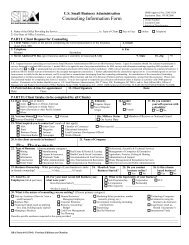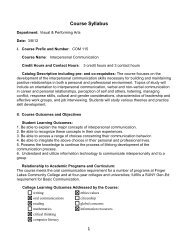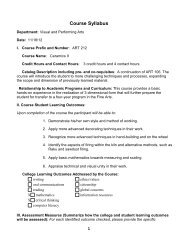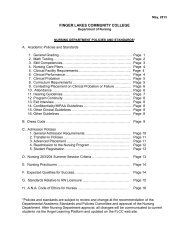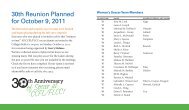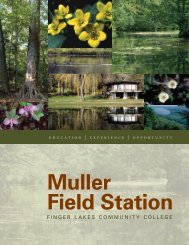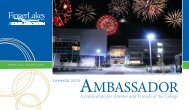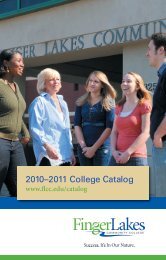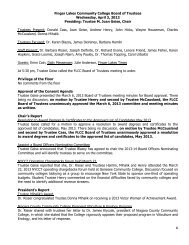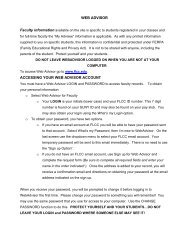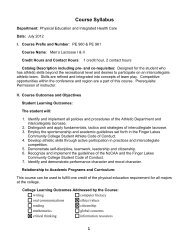Course Syllabus
Course Syllabus
Course Syllabus
Create successful ePaper yourself
Turn your PDF publications into a flip-book with our unique Google optimized e-Paper software.
Department: Conservation<br />
Date: October 5, 2012<br />
I. <strong>Course</strong> Prefix and Number: WFS 135<br />
<strong>Course</strong> <strong>Syllabus</strong><br />
<strong>Course</strong> Name: Wildland Fire Suppression Topics I<br />
Credit Hours and Contact Hours: 1 credit hour and 1 contact hour<br />
Catalog Description including pre- and co-requisites: supporting data required for grade<br />
prerequisite of ‘C’ or higher.<br />
This course is designed to provide students with the opportunity to complete specialized<br />
training in wildland fire suppression topics not typically or regularly offered as part of the<br />
wildland fire suppression certificate program. All specialty courses will meet NWCG (National<br />
Wildfire Coordinating Group) standards. Topics typically involve a field component and may<br />
be held as a residential course at the Muller Field Station or the East Hill campus. Prerequisite:<br />
CON 255/WFS 130 or any NWCG recognized S-130 course.<br />
Relationship to Academic Programs and Curriculum including SUNY Gen Ed<br />
designation if applicable:<br />
This course will be an elective for the Wildland Fire Suppression certificate.<br />
II. <strong>Course</strong> Student Learning Outcomes: State the student learning outcome(s) for the course (e.g.<br />
Student will be able to identify…)<br />
These will vary according to the specific topic. A syllabus indicating the learning<br />
Outcomes will be provided.<br />
College Learning Outcomes Addressed by the <strong>Course</strong>: (check each College Learning<br />
Outcome addressed by the Student Learning Outcomes)<br />
These will vary according to the specific topic. A syllabus indicating the learning<br />
Outcomes will be provided.<br />
writing computer literacy<br />
oral communications ethics/values<br />
reading citizenship<br />
mathematics global concerns
critical thinking information resources<br />
III. Assessment Measures (Summarize how the college and student learning outcomes<br />
will be assessed): For each identified outcome checked, please provide the specific assessment<br />
measure.<br />
As unique learning outcomes are established for each “Topic” offered, unique<br />
assessment measures will be detailed. Examples include student presentations (oral and<br />
written), demonstration of skills, written and oral exams and group projects.<br />
List identified College Learning Outcomes(s) Specific assessment measure(s)<br />
IV. Instructional Materials and Methods<br />
Types of <strong>Course</strong> Materials:<br />
Appropriate course material including manuals, selected relevant readings, workbooks and<br />
visuals.<br />
Methods of Instruction (e.g. Lecture, Lab, Seminar …):<br />
Lecture, field experience, student led discussions and group projects may all be used.<br />
V. General Outline of Topics Covered:<br />
Each “Topic” offered will have different material covered. In general, our guidelines within the<br />
Department are to offer topics that are not covered in other courses, are explored in greater<br />
detail than in other courses or are not offered regularly due to availability of certified<br />
instructors. Examples of WFS Topics which may be offered include: WFS Crew Boss<br />
(Single Resource S-230), Intermediate Wildland Fire Behavior (S-290) or any<br />
other WFS course which meets NWCG standards.<br />
7/12



